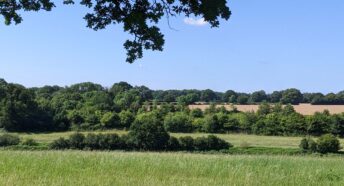£34 million on a new station that will increase journey time from Thanet to London: a 'robust business case'... apparently

Sometimes a planning decision leaves you struggling for words – and that by Kent County Council’s planning committee to approve a parkway station that will increase journey times from Thanet to London certainly hits the spot.
Councillors decided by eight votes to five to approve the £34 million Thanet Parkway project, choosing to put aside a Department for Transport statement from 2018 that its panel was “concerned that accommodating an additional stop at Thanet Parkway would add two minutes to the journey on the line between Ashford and Ramsgate”.
The county council argument has been that the station will in fact cut journey times to London by three minutes – yes, you read that correctly: three minutes – although it is by no means clear how even that laughably small reductionwill be achieved.
Extraordinarily, Thanet now has eight railway stations.
The committee made its decision in a virtual public meeting on Wednesday, September 2.
It is telling that committee members representing Thanet all voted against the scheme regardless of their party affiliation – but what do they know?
Clearly the statement by Sharon Thompson, the county council’s head of planning applications, that “We are confident the business case is robust” carried more weight, despite a lack of supporting evidence.
KentOnline reported how committee vice-chairman Dick Pascoe dismissed the idea that Thanet would be oversupplied with train stations by talking about Chinese restaurants: “A Chinese restaurant wanted to open in a Kent area where there were several Chinese restaurants and we did not say no,” he apparently said.
How £34 million for a scheme that will increase journey times represents a robust business case is something you might like to ponder over your evening Horlicks. As for the Chinese restaurants thing, perhaps it’s best not to think about it.
For more on this baffling decision, click here
Wednesday, September 9, 2020
- A number of important documents have yet to emerge. For example, a rigorous transport plan and a finalised air-quality assessment. The latter is critical given that allocations at Teynham will feed extra traffic into AQMAs.
- There seems to be no coherent plan for infrastructure delivery – a key component of the plan given the allocations being proposed near the already crowded Junction 7.
- There seems to have been little or no cooperation with neighbouring boroughs or even parish councils within Swale itself.
The removal of a second consultation might have been understandable if this final version of the plan were similar to that being talked about at the beginning of the consultation process. It is, however, radically different in the following ways:
- There has been a major shift in the balance of housing allocations, away from the west of the borough over to the east, especially around the historic town of Faversham. This is a move that raises many concerns.
- A new large allocation, with accompanying A2 bypass, has appeared around Teynham and Lynsted, to which we are objecting.
- Housing allocations in the AONB around Neames Forstal that were judged “unsuitable” by the council’s own officers have now appeared as part of the housing numbers.
- Most of the housing allocations being proposed are on greenfield sites, many of them on Grade 1 agricultural land – a point to which we are strongly objecting.
Concerns about the rush to submit the plan
The haste with which the plan is being prepared is especially worrying given the concentration of housing in Faversham. If the town is to take a large amount of new housing, it is imperative that the policies concerning the area are carefully worked out to preserve, as far as possible, the unique nature of the town. The rush to submit the plan is likely to prove detrimental.
As Swale does not have a five-year land housing supply, it is open to speculative development proposals, many of which would run counter to the ideas contained in the current plan. Some are already appearing. This is a common situation, and one that, doubtless, is a reason behind Swale’s haste.
Our overriding fear, however, is that this emphasis on haste is ultimately going to prove counterproductive. This is because it is our view that the plan, in its current form, is unlikely to pass independent examination. We are urging Swale to listen to and act upon the comments being made about the plan and to return the plan to the council with appropriate modifications before submitting it to the Secretary of State.
Essentially, this means treating the current consultation not as the final one but as the ‘lost’ second consultation.
The consultation ends on Friday 30 April and we strongly urge residents to make their opinions known if they have not already done so.
Further information








